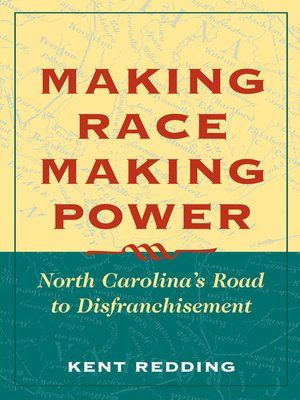
Sign up to save your library
With an OverDrive account, you can save your favorite libraries for at-a-glance information about availability. Find out more about OverDrive accounts.
Find this title in Libby, the library reading app by OverDrive.



Search for a digital library with this title
Title found at these libraries:
| Library Name | Distance |
|---|---|
| Loading... |
In this groundbreaking study, Kent Redding examines the fluid political landscape of the nineteenth-century South, revealing the complex interplay between the elite's manipulation of political and racial identity and the innovative mobilizing strategies marginalized groups adopted in order to combat disfranchisement.
Far from being a low-level, localized trend, the struggle for power in North Carolina would be felt across the entire country as race-and class-based organizing challenged the dominant models of making and holding power.
Redding reveals how the ruling class operates with motivations and methods very similar to those of the black voters and Populist farmers they fought against. He tracks how the elites co-opted the innovative mobilizing strategies of the subaltern groups to effectively use their own weapons against them.
At the core of Making Race, Making Power is an insightful dissection of the concrete connections between political strategies of solidarity and exclusion and underlying patterns of race relations.
| Introduction i 1. The Structuring of Southern Voter Turnout 17 2. North Carolina Democratic Politics and Society in the 1880s: Democratic Control through Localism 31 3. Making and Blocking Republican Power 58 4. The Demise of Democratic Localism and the Rise of Populism 74 5. The Failed Alternatives to Democratic Rule: Movement-Party Disjunctions in Populism 93 6. Democrats Transformed, Democracy Undone 112 Conclusion 135
Far from being a low-level, localized trend, the struggle for power in North Carolina would be felt across the entire country as race-and class-based organizing challenged the dominant models of making and holding power.
Redding reveals how the ruling class operates with motivations and methods very similar to those of the black voters and Populist farmers they fought against. He tracks how the elites co-opted the innovative mobilizing strategies of the subaltern groups to effectively use their own weapons against them.
At the core of Making Race, Making Power is an insightful dissection of the concrete connections between political strategies of solidarity and exclusion and underlying patterns of race relations.
| Introduction i 1. The Structuring of Southern Voter Turnout 17 2. North Carolina Democratic Politics and Society in the 1880s: Democratic Control through Localism 31 3. Making and Blocking Republican Power 58 4. The Demise of Democratic Localism and the Rise of Populism 74 5. The Failed Alternatives to Democratic Rule: Movement-Party Disjunctions in Populism 93 6. Democrats Transformed, Democracy Undone 112 Conclusion 135







